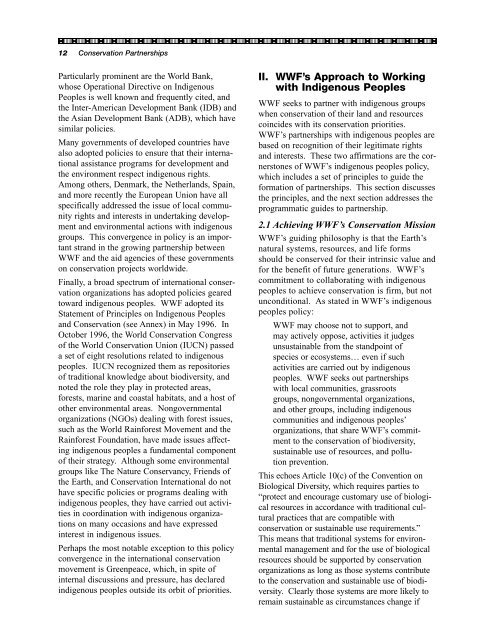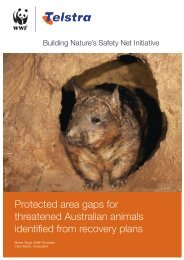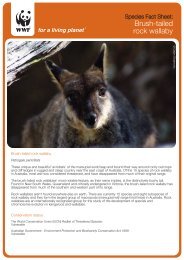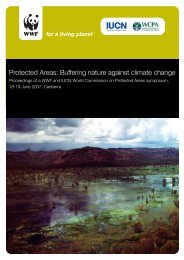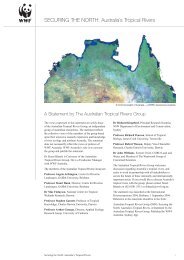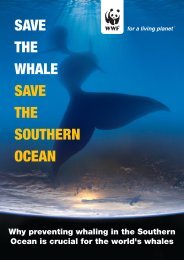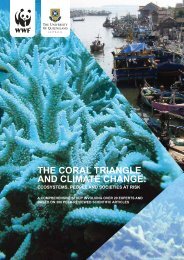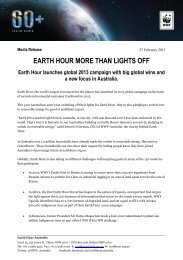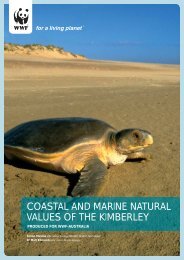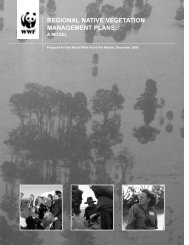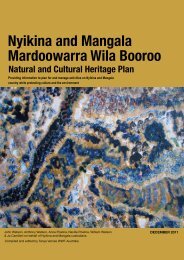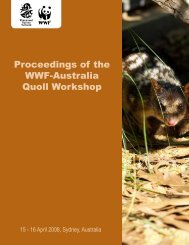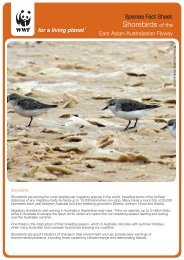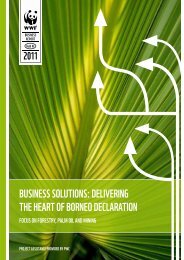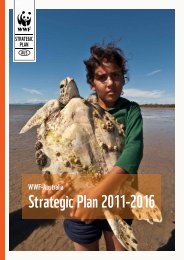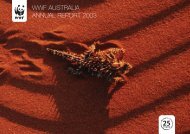Indigenous Peoples and Conservation Organizations
Indigenous Peoples and Conservation Organizations
Indigenous Peoples and Conservation Organizations
You also want an ePaper? Increase the reach of your titles
YUMPU automatically turns print PDFs into web optimized ePapers that Google loves.
12 <strong>Conservation</strong> Partnerships<br />
Particularly prominent are the World Bank,<br />
whose Operational Directive on <strong>Indigenous</strong><br />
<strong>Peoples</strong> is well known <strong>and</strong> frequently cited, <strong>and</strong><br />
the Inter-American Development Bank (IDB) <strong>and</strong><br />
the Asian Development Bank (ADB), which have<br />
similar policies.<br />
Many governments of developed countries have<br />
also adopted policies to ensure that their international<br />
assistance programs for development <strong>and</strong><br />
the environment respect indigenous rights.<br />
Among others, Denmark, the Netherl<strong>and</strong>s, Spain,<br />
<strong>and</strong> more recently the European Union have all<br />
specifically addressed the issue of local community<br />
rights <strong>and</strong> interests in undertaking development<br />
<strong>and</strong> environmental actions with indigenous<br />
groups. This convergence in policy is an important<br />
str<strong>and</strong> in the growing partnership between<br />
WWF <strong>and</strong> the aid agencies of these governments<br />
on conservation projects worldwide.<br />
Finally, a broad spectrum of international conservation<br />
organizations has adopted policies geared<br />
toward indigenous peoples. WWF adopted its<br />
Statement of Principles on <strong>Indigenous</strong> <strong>Peoples</strong><br />
<strong>and</strong> <strong>Conservation</strong> (see Annex) in May 1996. In<br />
October 1996, the World <strong>Conservation</strong> Congress<br />
of the World <strong>Conservation</strong> Union (IUCN) passed<br />
a set of eight resolutions related to indigenous<br />
peoples. IUCN recognized them as repositories<br />
of traditional knowledge about biodiversity, <strong>and</strong><br />
noted the role they play in protected areas,<br />
forests, marine <strong>and</strong> coastal habitats, <strong>and</strong> a host of<br />
other environmental areas. Nongovernmental<br />
organizations (NGOs) dealing with forest issues,<br />
such as the World Rainforest Movement <strong>and</strong> the<br />
Rainforest Foundation, have made issues affecting<br />
indigenous peoples a fundamental component<br />
of their strategy. Although some environmental<br />
groups like The Nature Conservancy, Friends of<br />
the Earth, <strong>and</strong> <strong>Conservation</strong> International do not<br />
have specific policies or programs dealing with<br />
indigenous peoples, they have carried out activities<br />
in coordination with indigenous organizations<br />
on many occasions <strong>and</strong> have expressed<br />
interest in indigenous issues.<br />
Perhaps the most notable exception to this policy<br />
convergence in the international conservation<br />
movement is Greenpeace, which, in spite of<br />
internal discussions <strong>and</strong> pressure, has declared<br />
indigenous peoples outside its orbit of priorities.<br />
II. WWF’s Approach to Working<br />
with <strong>Indigenous</strong> <strong>Peoples</strong><br />
WWF seeks to partner with indigenous groups<br />
when conservation of their l<strong>and</strong> <strong>and</strong> resources<br />
coincides with its conservation priorities.<br />
WWF’s partnerships with indigenous peoples are<br />
based on recognition of their legitimate rights<br />
<strong>and</strong> interests. These two affirmations are the cornerstones<br />
of WWF’s indigenous peoples policy,<br />
which includes a set of principles to guide the<br />
formation of partnerships. This section discusses<br />
the principles, <strong>and</strong> the next section addresses the<br />
programmatic guides to partnership.<br />
2.1 Achieving WWF’s <strong>Conservation</strong> Mission<br />
WWF’s guiding philosophy is that the Earth’s<br />
natural systems, resources, <strong>and</strong> life forms<br />
should be conserved for their intrinsic value <strong>and</strong><br />
for the benefit of future generations. WWF’s<br />
commitment to collaborating with indigenous<br />
peoples to achieve conservation is firm, but not<br />
unconditional. As stated in WWF’s indigenous<br />
peoples policy:<br />
WWF may choose not to support, <strong>and</strong><br />
may actively oppose, activities it judges<br />
unsustainable from the st<strong>and</strong>point of<br />
species or ecosystems… even if such<br />
activities are carried out by indigenous<br />
peoples. WWF seeks out partnerships<br />
with local communities, grassroots<br />
groups, nongovernmental organizations,<br />
<strong>and</strong> other groups, including indigenous<br />
communities <strong>and</strong> indigenous peoples’<br />
organizations, that share WWF’s commitment<br />
to the conservation of biodiversity,<br />
sustainable use of resources, <strong>and</strong> pollution<br />
prevention.<br />
This echoes Article 10(c) of the Convention on<br />
Biological Diversity, which requires parties to<br />
“protect <strong>and</strong> encourage customary use of biological<br />
resources in accordance with traditional cultural<br />
practices that are compatible with<br />
conservation or sustainable use requirements.”<br />
This means that traditional systems for environmental<br />
management <strong>and</strong> for the use of biological<br />
resources should be supported by conservation<br />
organizations as long as those systems contribute<br />
to the conservation <strong>and</strong> sustainable use of biodiversity.<br />
Clearly those systems are more likely to<br />
remain sustainable as circumstances change if


